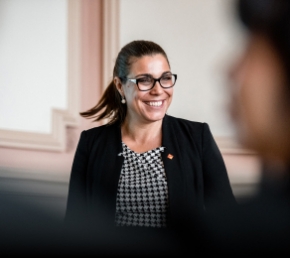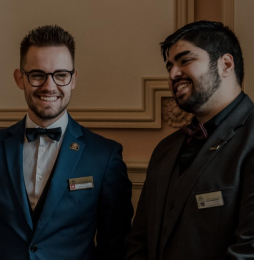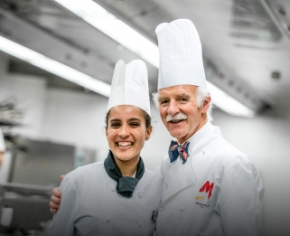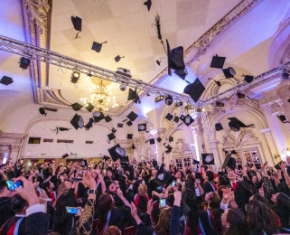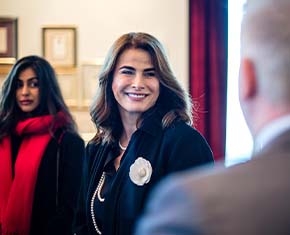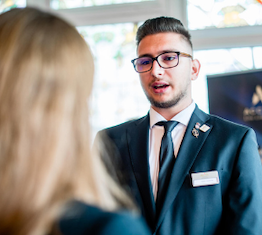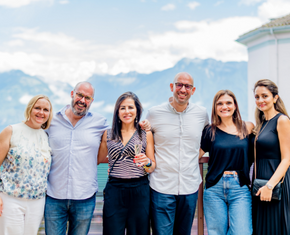- About
- Schools
- Lifelong Education
- News & Events
- Community
#Corporate News
World Tourism Day 2023
Focusing on Sustainability and Education with Swiss Education Group CEO, Leo Wang
World Tourism Day (WTD), celebrated every year on September 27th, is an occasion of great significance, marking a global recognition of the tourism industry's profound impact on economies, cultures, and the environment. Hosted by the United Nations World Tourism Organization (UNWTO), WTD brings together leaders, experts, and influencers to discuss the industry's challenges and opportunities.
The biggest event in its history held in the fastest growing region.
Leaders from across the global tourism sector met in Riyadh, Saudi Arabia, for the 43rd anniversary of World Tourism Day. The event was an example of the power of tourism and an opportunity for government ministers, industry leaders and experts to explore avenues for collaboration.
"We have a historic opportunity to chart a new course for the global tourism sector, centered on sustainable development, job creation, and economic resilience," says His Excellency Ahmed Al-Khateeb, Minister of Tourism of Saudi Arabia, who spoke at the event in his homeland.
Saudi Arabia has the world's fastest post-pandemic sector recovery among G20 countries and is set to continue this pace with its Saudi Vision 2030 initiative.
Tourism and green investments.
The theme this year was “Tourism and green investments”, and the illustrious event included a distinguished guest speaker, Mr. Leo Wang, CEO of Swiss Education Group (SEG), who shared valuable insight into the future of tourism and education.
On the stage at the 2023 World Tourism Day event in Riyadh, Mr. Leo Wang joined a panel of influential figures, including his Excellency, Mr. Mehmit Nuri Erasoy, Ms. Julia Simpson, CEO of the World Travel and Tourism Council (WTTC), Mr. Nika Gilauri, CEO of Reformatics, and Mr. Niall Gibbons from the tourism sector of NEOM. Leo Wang's contributions to the discussion provided a unique perspective on the intersection of education, sustainability, and tourism.
Speaker: I think young people today have concerns about travel and sustainability. Everyone wonders whether it's possible to be sustainable and be a tourist. If there is one key word, from your perspective, that you want the people in this room and the people watching to take away from World Tourism Day, what would that be?
Leo Wang: As part of the private sector for education in hospitality, we have a different angle on this issue. In the past, sustainability was an area that was missed by everyone, but it can absolutely align with a shared vision between industry, business, government, and education. Everything starts with education, whether you are a young student at one of our schools or a life-long learner in the corporate world. As an education body, we are doing our part to educate students in developing green standards for the hospitality industry, and this can be linked to all industry with a shared vision.
Currently, we are seeing a high demand in all industries for employees with the soft skills standards that are taught in hospitality education. In the future, I see a demand for “green skills”. So where hospitality has set the standard for soft skills, who is to set the standard for green skills? This will take a shared vision. But, in the future, I see green skills on the CV’s of job seekers, along with their digital skills and their language skills. So, the keyword for me today is green skills.
Speaker: How do you explain to prospective students and their parents that tourism can be a career, from an education point of view? How do you make young people see tourism as a career rather than a hobby and parents to see it as a viable career?
Leo Wang: When you look at the tourism industry, parents and youth have very different perspectives. Right now, some percentage of parents still have concerns because it’s about their children–their safety, their future. They are worried that after graduation, when they enter the workforce in hospitality, they will have a very hard job. In hotel reception, for example, it takes years to progress from entry level work. But that’s where our education helps. We are very hands-on. The students hold internships where they learn the front lines, and what's going on. They enter the workforce having already had that experience, and they climb the ranks faster.
But it isn’t just the work experience that gets them ahead faster: it’s soft skills. This is the foundation of hospitality education. And soft skills are transferable to other industries. They are not just for the tourism industry. Graduates know how meet people, how to speak properly to people, how to honor cultural differences. They understand how to handle different situations and scenarios. These are skills you will apply in your personal and professional life and are in demand in all careers.
For example, our alumni – more than 50,000 right now globally, representing 110 countries – about 60% of them are still working in the hospitality industry, but 40% have moved into other industries. They are successful due to these foundational skills. They have learned from this industry and transferred the knowledge to other industries.
When you explain this to parents, it opens their eyes to the potential a hospitality education offers.
Speaker: So, I've been trying to avoid using this scary word that we would all just like to forget, but COVID. COVID really put the spotlight on how important tourism really is to so many economies. I would say, really, every economy. What challenges emerged from the pandemic, and do they still exist?
Leo Wang: It is interesting to note that the industry didn’t just recover from COVID, it rebounded and came back stronger! On a personal level, people saw tourism take a hit, but travel isn’t just tourism. The industry is interconnected with all business– globally. Therefore, though it could take a hit with another pandemic, hopefully we will be better prepared, but we also know it will again rebound. However, right now, the memory of COVID is still very fresh. I think everyone still needs some time to recover mentally from the shock, both parents and students.
The Significance and Objectives of World Tourism Day.
As we reflect on the discussions at World Tourism Day 2023, it becomes clear that this annual event serves as a crucial platform for addressing the challenges and opportunities within the tourism industry. The significance of WTD lies in its ability to bring together experts, leaders, and visionaries to shape the future of tourism. It underscores the importance of sustainability, education, and the development of "green skills" to meet the evolving demands of the industry.
The objectives of WTD remain consistent, emphasizing the following key points:
-
Promoting Sustainable Tourism: WTD encourages the adoption of sustainable practices in the tourism industry to minimize environmental and social impacts.
-
Highlighting Cultural Diversity: The day celebrates the preservation and promotion of cultural heritage through tourism.
-
Economic Growth: WTD recognizes tourism as a driver of economic growth, job creation, and development, particularly in underserved regions.
-
Fostering Global Solidarity: It provides a platform for nations to collaborate and address common tourism-related challenges.
-
Educational Initiatives: WTD promotes educational programs related to tourism, showcasing its potential as a career path, and emphasizing the importance of soft skills and green skills.
World Tourism Day remains a pivotal event on the global calendar, focusing on sustainability, education, and the resilience of the tourism industry. The insights shared by Leo Wang and other industry experts shed light on the path forward for tourism, emphasizing the need for a shared vision and a commitment to green skills and sustainable practices.
#Corporate News

